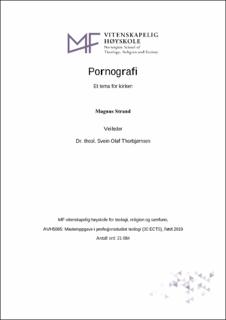| dc.description.abstract | How can the church can deal with pornography consumption? To answer this question a contemporary Christian ethic of sexuality, based on the concept of desire, is developed. This ethic of sexuality is used as the theoretical perspective on the empirical material, consisting of mainly academical literature on pornography. A discursive analysis of the study material is made to develop the following conclusions:
Concerning the issue of the pornography consumption by children and adolescents, an argument for an ongoing dialogue has been made. Rather than seeking to protect children and adolescents from sexual content in media, the emphasis should be on the acknowledgment and guidance of their sexual desire. A similar argument has been made against the perception of pornography as a drug, and pornography consumption as a form of addiction. Several recent Christian publications argue that many Christians are addicted to porn, and that this addiction is the cause of great aguish. In this thesis however, it is argued that moral incongruence and shame, is the more probable cause. The task of the church is therefore to adjust an overly large focus on sexual sins and create a community where sexual desires can be discussed. Finally, the question of whether pornography consumption can be understood as infidelity, is discussed. It is argued, that pornography consumption in a relationship not necessarily equates infidelity. It is rather misdirected desire with the possibility of leading to infidelity. | en_US |
